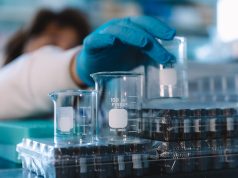By Ariel Worthy
The Birmingham Times

Stacy Haynes, a general and cosmetic dermatologist in Hoover, credits her mother for her career choice.
“I wanted to be a urologist,” Haynes said. “This was back in the day when everybody was old-fashioned. I came home and said, ‘Mom I want to be a urologist. I think I’ll be a great one.’ She said, ‘Oh, no. No self-respecting young lady would want to be a urologist.’”
Haynes, who was in medical school at the time, said she had to find another [clinical] rotation, which is shadowing physicians and residents at teaching hospitals with hands-on experience. She settled on dermatology but wasn’t excited by it.
“The guy who came to the class showed all of the grossest pictures of skin cancer you’d never want to see—eyes coming out, people with no ears, no noses—I was like, ‘I never want to do that!’ … ‘Oh, I don’t want to be here.’”
But that changed when she started attending her rotations, “[Then] I was like, ‘Oh, I love it!’”
Haynes, originally from Nashville, Tenn., moved to Birmingham in 1991 after her husband got a job offer in the Magic City. Haynes has two daughters, Kamaria Nelson, 27, who just graduated from medical school, and Janaya Nelson, 20, who is in her third year at Spelman College.
Natural Healing
In her practice, Haynes said she likes to integrate natural ways of healing: “People like it when you get to use your own body to work for you.”
One example: The Vampire Series (VS), which was created by another doctor in Birmingham, Charles Reynolds. For this treatment, your own blood is drawn and spun down to separate the platelets from the serum.
“Platelets are all the things that have the growth factors that regenerate everything,” Haynes explained. “Remember when you were a little kid, had a bicycle accident, and skinned your knee? Your knee looked white and bloody, so when your mom cleaned you up, you just had this white patch.
“You thought, ‘Oh, my god, I’ll never get the regular color back.’ Well, lo and behold, a few months later your skin was back to normal. That’s what platelets do. So, when they are injected into the face, for instance, they regenerate and rejuvenate the facial tissues. If they are put in the scalp, they can regenerate and rejuvenate that area.”
The serum is used, as well. It can be used for the scalp to rejuvenate hair follicles and to give hair oxygen. It also can be injected it into breast tissue, “which we call the vampire breast lift,” Haynes said. “It helps rejuvenate and give that fullness.”
Skin Protection
Haynes said black skin has protection because of melanin. Still, it is important to take care of the skin, especially while younger, which is easier than when a person becomes older.
“Prevention is important, especially for my millennials,” she said. “That’s the age you really should start getting into good, healthy habits for your skin. … [Don’t] wait until your 40s or 50s, when it becomes dangerous or something that’s too much to handle and requires surgery.”
Black people get skin cancer just like everyone else, Haynes said, and the best way to prevent it is to wear sunscreen when out in the sun for extended periods of time.
“Usually, we don’t wear sunscreen because we have natural protection—melanin is natural protection,” she said. “But because we are enjoying the sun more, … we are beginning to experience things [white people] have been getting for years and centuries. It’s not that black don’t crack; it’s that we’ve been taking care of ourselves. So now I remind people more, don’t forget to wash your skin twice a day. Don’t forget to apply sunscreen. And start getting facials now to prevent large pores.”
Getting a facial every few months can help, Haynes said.
“People think, ‘If I go to the dermatologist, it’s going to cost thousands of dollars.’ Getting a chemical peel once a quarter to maintain your skin tone and texture, getting a facial to smooth and polish out your skin, some of these treatments start at $50. The ones to maintain your skin once a quarter aren’t expensive at all.”
Dermatologists also offer services such as facials and chemical peels on the cosmetic side, Haynes said.
“We use medical-grade equipment, compared with a spa, so our results tend to go a little deeper,” she said. “At a spa, [the treatment] is a little more superficial and you have to see them more.”
To set up an appointment with Haynes, visit www.drstacyhaynes.com or call 205-988-3733.




